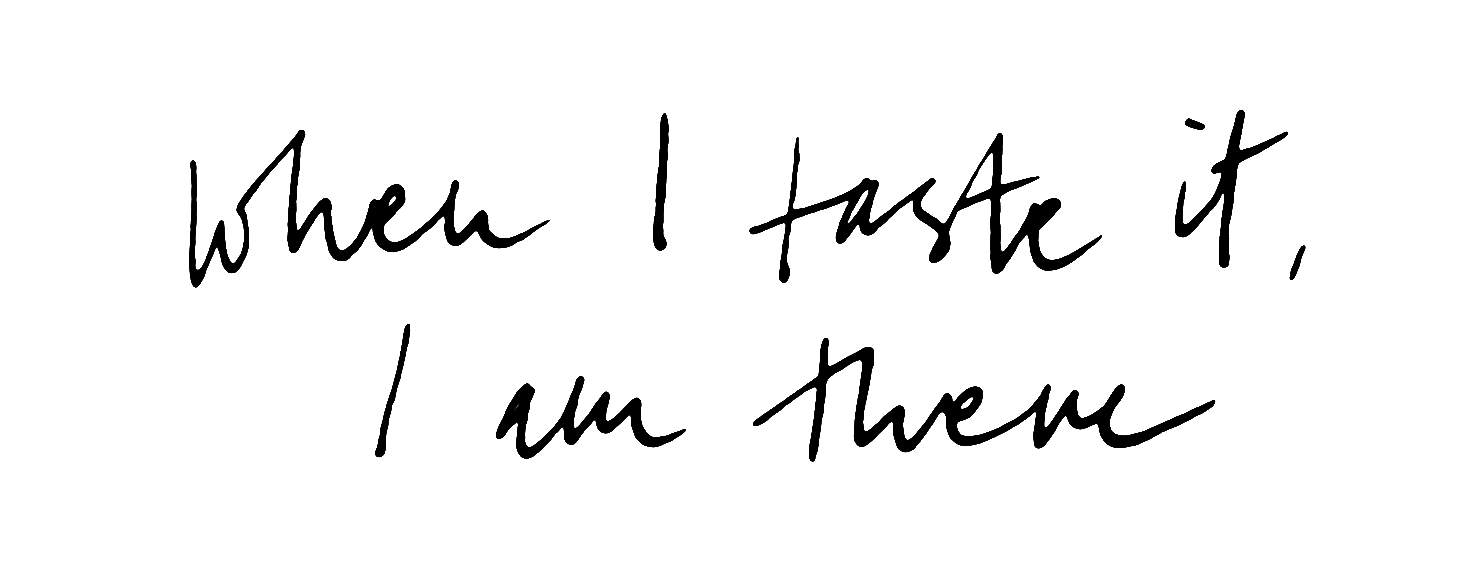WORDS BY GILL MELLER
Essay
The Taste of Memory
Cooking to remember
WORDS BY GILL MELLER
How does the past shape the way we cook today? From cooking over an open fire in Southern France to the pop of a raw sheep’s eye, chef and writer Gill Meller explores the connection between food and memory.
It is a snow day here in Dorset.
There is a certain stillness to the house that only comes with snow. I knew as soon as I opened my eyes that it had fallen in the night. The tone of light had shifted and familiar sounds were gone.
I’ve been told the year my sister was born it snowed so much you could walk on top of the hedges, and it didn’t melt for weeks. I was born two years later.
I remember sitting inside looking out at the snow on my third birthday. I was given a small train, which I was holding in my hand. The light was the same as it is today. This must be one of my earliest memories, alongside that of my sister and I sitting behind a curtain eating crisps. We would sit cross-legged and say, at the same time, "one crisp", at which point we’d eat the crisp. Then we’d say, again in unison, "one drink", and we’d take a sip of squash from a plastic beaker. The game was, unsurprisingly, called ‘One Crisp, One Drink’ and we played it often. Isn’t it strange how we remember such moments from so long ago?
I remember the salt on crisp skin, the smell of burning rosemary and the dappled light from the fig tree above
Memories are, after all, the only thing we really have. Since the future hasn’t happened yet, and the present disappears with the blink of an eye, it will always be the past that we call on; it is the past that shapes us. I’m fascinated by the connection between food and memory and how that might shape the way we cook today.
I remember most of the delicious things I’ve eaten in my life. The memories linger, embodying and memorialising parts of the experience – the time, the light, the people I was with. A duck being cooked over an open fire in Southern France has particular resonance for me. I remember the salt on crisp skin, the smell of burning rosemary and the dappled light from the fig tree above.
For something to be delicious there needs to be other things that are less so, and of course we tend to remember these too. The raw sheep’s eye I ate in my teens left such a scar I can still feel the way it burst in my mouth.

Knowing what you don’t like will improve your cooking, but not as much as knowing what you do like. I recognised long ago that I wouldn’t cook with sheep’s eyes, the mark I have is one of total distaste. In perfect contrast, I’ve grilled duck over a smoky fire countless times. It is blissful, the very act takes me back to that point in my life; to the heat, to the cicadas, to my mum’s side. If I close my eyes when I taste it, I am there.
One year I actually did go back, with my wife Alice and our daughter Isla, and cooked the same thing for them on the same spot where we’d built that fire all those years before. If food can evoke fond memories or take us to a happy place then cook on.
To touch, to listen, to see, to smell and to taste – our senses are the architects of memory, collectively as well as individually. The point at which one or more of those senses triggers a memory can only ever happen in the present. It’s like a switch being flipped that sets off a small electric storm in one’s mind.
I’ve been so bound up in food and cooking throughout my life, that the majority of the memories I’ve made are connected to it, even if the bridge is indirect. Often the things I cook now can whisk me back unexpectedly. In the late eighties, when I was eight or nine years old, we rented a house right next to a sheep farm. There was an old barn in the field, which was full of straw bales. We used to have such fun playing in there. I remember the grazes from the straw on my legs and how much it hurt when I got in the hot bath at the end of the day. Last year I made a sheep’s cheese and nettle tart, and for some reason it took me right back to the barn and to a landscape I’ve long since left. Now every time I make this tart or even think about making it, I’m back there, and as such the memory has been fixed, it’s been hard-wired to the present. I think of it like an anchor holding a boat in a raging tide. I hope to keep laying down anchors.
The success of a dish and the mark it leaves on us and our people – family and friends – is tangible through the memories we make. My mum would cook a delicious dish of fried chicken in breadcrumbs served with spaghetti in a simple tomato sauce. Everyone who ate the dish fell in love with it immediately. Then, they would go away and make if for themselves or for their people. That’s what good food does. Now I cook it, Alice cooks it, my brother cooks it, and even my daughters cook it and as such something has been created that could live forever. My mum died last year leaving a massive void that no one can fill, but the memories I have live on. Cooking helps me remember, taste takes me back.






